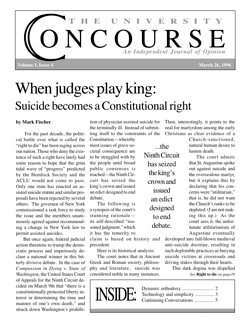NFP and connaturality
by Kathleen van Schaijik
Speaking of connaturality, (see “St. Thomas and Catholic connaturality” in this issue) Dr. Waldstein has made an important point apropos of the NFP discussion. Last week he wrote me the following: “When one makes the distinction between actions that are the fruit of careful and prayerful moral reasoning and actions that are mechanical, one should perhaps emphasize a tertium quid: namely, actions that flow from a connaturality with what is good: St. Elizabeth of Hungary gave alms to beggars out of an intense connaturality with Christ and His mercy. Such actions seem similar to those that proceed from careful and prayerful reflection in being truly morally good actions, and yet also similar to mechanical ones in being immediate and spontaneous, without requiring reasoning.”
He zeros right in on a weakness I had sensed (without being able to articulate it to myself) in my original article. My criticism of “providentialism” left the impression that married couples best live out their vocation when they consciously deliberate over the number of children they should have. Dr. Waldstein reminds me that many live by a more spontaneous conformity with the divine plan for family life—without conscious “discernment” about family size, but nonetheless with a free and responsible openness to and trust in God’s perfect providence. It seems to me that NFP can be part of this connatural union with goodness—i.e. when it is practiced by couples who, without delving minutely into the the doctrinal question or worrying about whether their reasons are grave enough, spontaneously recognize its blessing for their family and receive it with gratitude.
My thanks for a insight which enriches the discussion and at the same time gently corrects a mis-placed emphasis in my position.
Meanwhile, his letter also raised the intriguing question of the role of communities in developing connaturality, which I hope will be taken up with more completeness by him and others in future issues of the Concourse. I am wondering particularly about the relation between the charismatic renewal—with its strong emphasis on discerning God’s will—and the break-down of “normal” Catholic culture and parish life.
In some ways it seems to me that the conscious awareness of and cooperation with God’s plan for our individual lives, which is so characteristic of those in the renewal, represents a definite advance in the lived-faith of Catholics. (This is particularly evident among the numerous youth in the renewal, who not only consider themselves Catholics, but who deeply and ardently desire to lay down their lives for God.) But at the same time, I think it can be seen as a sort of “unusual” gift of grace given (perhaps only for a time) to help the faithful survive the emergency situation of the anti-Christian culture of the day, and all the time intended to lead us to the re-establishment of an unselfconscious, connatural communal life of faith.
Would love to read others’ thoughts on this.
Kathleen van Schaijik, Class of ‘88


